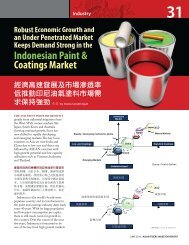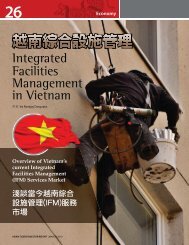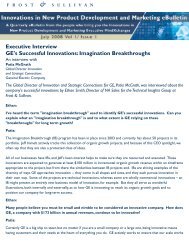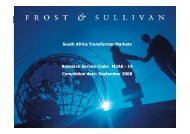Beyond the Bottom Line - Growth Consulting - Frost & Sullivan
Beyond the Bottom Line - Growth Consulting - Frost & Sullivan
Beyond the Bottom Line - Growth Consulting - Frost & Sullivan
Create successful ePaper yourself
Turn your PDF publications into a flip-book with our unique Google optimized e-Paper software.
<strong>Beyond</strong> <strong>the</strong> <strong>Bottom</strong> <strong>Line</strong>: Teleco-Sustainability<br />
By Brian Cotton, PhD<br />
Vice President of ICT <strong>Growth</strong> <strong>Consulting</strong><br />
<strong>Frost</strong> & <strong>Sullivan</strong> Canada<br />
What is Eco-Sustainability?<br />
Sustainability is a foundational concept that has found its way into many aspects of human activity, including commerce<br />
and business strategies. A widely accepted definition of sustainability is derived from <strong>the</strong> 1987 Brundtland<br />
Commission report, which characterizes an activity as sustainable if it “meets <strong>the</strong> needs of <strong>the</strong> present without<br />
compromising <strong>the</strong> ability of future generations to meet <strong>the</strong>ir own needs.”<br />
In today’s rapidly changing climate, dwindling natural resources, and a human population of 6.8 billion, sustainability is<br />
being closely linked to environmental responsibility. Scientists and economists have warned that current practices are<br />
leading to an unsustainable world (see for example, The Limits of <strong>Growth</strong>, The 30-Year Update, by Meadows, Randers, and<br />
Meadows). In this context, companies are examining <strong>the</strong>ir role to become more sustainable. A small group of <strong>the</strong>m<br />
are also going a step fur<strong>the</strong>r, investigating and creating ways to use sustainability to drive profitability beyond bottom<br />
line savings and into true revenue growth.<br />
The practice of sustainably-profitable, environmentally-respectful business can be labeled eco-sustainability. In <strong>the</strong><br />
commercial sense, eco-sustainability can be defined as a business that has a net positive impact on <strong>the</strong> environment, is<br />
eco-efficient, and generates renewable value with a full lifecycle perspective.<br />
In this definition, a net positive impact means that <strong>the</strong> overall impact or outputs of a business on <strong>the</strong> environment<br />
leave it in better shape than <strong>the</strong> input to <strong>the</strong> business from <strong>the</strong> environment. Eco-efficiency is a term for leveraging<br />
technological and process changes in order to generate solutions that offer more value than current offerings while<br />
reducing resource use and environmental impact throughout <strong>the</strong> product or service's life. Copper for example, can be<br />
used, recycled, and reused over many instances of product, each time adding value to <strong>the</strong> lifecycle (e.g., <strong>the</strong> value of <strong>the</strong><br />
copper is realized in each production and recycling process, which someone pays for), instead of adding value once and<br />
<strong>the</strong>n being discarded, such as in a landfill.<br />
As a corporate business strategy, eco-sustainability focuses on qualitative development and controlled purposeful<br />
growth, not only on physical expansion. The company extends its influence throughout <strong>the</strong> supply loop, so that costs<br />
are lowered by using renewable resources and eco-efficient methods. Profit <strong>the</strong>n becomes reflective of savings gained<br />
on minimizing <strong>the</strong> opportunity cost of environmentally-unfriendly processes, and on <strong>the</strong> upside of <strong>the</strong> value of<br />
sustainability distributed in <strong>the</strong> system.<br />
Creating and embodying an eco-sustainable strategy to industries producing tangible products is relatively<br />
uncomplicated, but applying it to industries that tend to produce more intangible products is not so straightforward.<br />
One would not think that telecommunications operators contribute to climate change, but <strong>the</strong>y do. The data center is<br />
so central to supplying telecommunications services, and which underlie much of modern e-business, have a subtle, but
eal impact on <strong>the</strong> environment. Recent work by Stanford University, <strong>the</strong> Uptime Institute, and AMD suggests that<br />
data centers contribute CO2 emissions in <strong>the</strong> same range as <strong>the</strong> airline industry, steel manufacturing, and ship building.<br />
This work also suggests that <strong>the</strong> cumulative impact of data centers contributes more CO2 to <strong>the</strong> atmosphere than<br />
does <strong>the</strong> country of Argentina or <strong>the</strong> Ne<strong>the</strong>rlands. Similarly, operating its network is <strong>the</strong> single largest source of<br />
power consumption for a typical telecom service provider. Therefore, eco-sustainability absolutely has a place in <strong>the</strong><br />
telecommunications industry.<br />
<strong>Frost</strong> & <strong>Sullivan</strong> has been covering eco-sustainability in <strong>the</strong> telecommunications industry since 2006. In that time, our<br />
work has uncovered a strong, but largely hidden trend of telecommunications service providers creating and following<br />
eco-sustainability strategies. Telecom companies tend to pursue eco-sustainability in three ways.<br />
Compliance to regulations or o<strong>the</strong>r mandated criteria.<br />
Eco-sustainability is pursued through adherence to defined limits and processes, which attempt to control<br />
consumption of non-renewable resources and curb <strong>the</strong> amount of pollution that needs to be absorbed by <strong>the</strong><br />
ecosystem. This is <strong>the</strong> most basic level of eco-sustainability strategy. Examples of regulations that directly impact<br />
telecom service providers include California’s 2006 Greenhouse Gas Bill and <strong>the</strong> mandate in China’s National Eleventh<br />
Five-Year Plan to lower power consumption by 20 percent per GDP unit. Telecom service providers can also set <strong>the</strong>ir<br />
own limits, such as BT’s goal to reduce CO2 emissions 80 percent from 1996 levels by 2016. Thus a compliance<br />
strategy engenders eco-sustainability by discouraging or slowing <strong>the</strong> impacts of unsustainable business practices.<br />
Commitment to sustainability through eco-efficiency.<br />
Here, eco-sustainability is pursued by using more resource efficient technologies to lower environmental impacts. This<br />
approach is often built on compliance actions, but adds a layer of pro-activity directed at lowering costs (saving on<br />
OPEX). Eco-sustainability is achieved through eco-efficiency, and collateral benefits are accrued, such as lower CO2<br />
emissions and recycling end-of-life network equipment. Higher CAPEX costs for renewable energy powered<br />
infrastructure are more than offset by <strong>the</strong> bottom line savings through <strong>the</strong> use of “free” energy. Under a commitment<br />
eco-sustainability strategy, Verizon has shown a savings in CO2 emissions with a trend of lower annual Carbon<br />
Intensity readings, defined as a ratio of metric tons of CO2 emitted per $1 million in revenue. As well, TELUS has<br />
demonstrated that from 2004 through 2007, its eco-efficiency -- <strong>the</strong> ratio of energy consumed to top-line revenues --<br />
has steadily improved. This is an important check on telecommunications eco-sustainability strategies because it<br />
shows that following such a strategy does not negatively impact overall revenue generation. Thus, a commitment<br />
strategy brings about sustainability discouraging unsustainable business practices and translates sustainable ones into<br />
bottom line savings.<br />
Command of eco-sustainability to drive top-line revenues.<br />
A command strategy goes one step fur<strong>the</strong>r than commitment because it uses eco-sustainability to drive new business<br />
and revenue streams. Building on compliance and commitment actions, telecom operators create new services that<br />
meet <strong>the</strong>ir own customers’ needs for sustainability solutions. Telecom Italia, in partnership with <strong>the</strong> Roman city<br />
government, has developed a service using cell phones that enables drivers to find <strong>the</strong> most direct route to available<br />
parking. This reduces gasoline costs for drivers, CO2 emissions in Rome, and can be a revenue generating service for
Telecom Italia. Representing <strong>the</strong> apex of eco-sustainability, a command strategy applies eco-efficiency throughout a<br />
service provider’s operations to generate value over and above current service offerings, it reduces resource use and<br />
environmental impact, and it can be used as a competitive differentiator in increasingly eco-aware customer bases.<br />
It should be noted that our eco-sustainable telecom service provider sits within a larger eco-system containing<br />
suppliers and consumers, and o<strong>the</strong>r key stakeholders including government, <strong>the</strong> financial community, and <strong>the</strong> media. All<br />
can play parts in a network of eco-sustainable relationships.<br />
Eco-Sustainability is Here to Stay<br />
More and more, sustainability is becoming a critical part of many companies’ CSR strategies. Telecommunications<br />
service providers are evolving eco-sustainability strategies that can reduce <strong>the</strong>ir impact on <strong>the</strong> environment, yield<br />
bottom line benefits, and can create new services for top line growth and competitive differentiation. These strategies<br />
can be highly adaptable, being useful in good economic times and bad. Remaining consistent to its roots,<br />
eco-sustainability is here to stay.<br />
Brian Cotton is <strong>the</strong> Vice President of <strong>the</strong> <strong>Frost</strong> & <strong>Sullivan</strong> Global ICT <strong>Consulting</strong> Practice, and heads up <strong>Frost</strong> & <strong>Sullivan</strong>’s<br />
Canadian operations. Brian believes that smart companies can help solve environmental problems, and be responsibly and<br />
sustainably profitable doing it. His domain expertise lies in applying ICT to elements of <strong>the</strong>se problems, generating new business<br />
opportunities out of <strong>the</strong>ir solutions, and creating strategies to capitalize on <strong>the</strong>m. Prior to joining <strong>Frost</strong> & <strong>Sullivan</strong>, Brian was a<br />
<strong>Consulting</strong> Analyst with <strong>the</strong> Horizon Research Corporation in Los Angeles, and a Haynes Foundation Scholar in Social Psychology<br />
at <strong>the</strong> University of Sou<strong>the</strong>rn California. Brian holds a Ph.D. in Social Psychology from <strong>the</strong> University of Sou<strong>the</strong>rn California, a<br />
BSc. in General Psychology from Indiana University, and a Certificate in Political Psychology from <strong>the</strong> Ohio State University. He is<br />
currently based in Toronto, Ontario.<br />
Brian will be delivering <strong>the</strong> Executive Analysis on Marketplace Opportunities for Sustainable Solutions, at <strong>the</strong> Global Green<br />
Revolution 2008 event in San Francisco on Wednesday, September 17, 2008.














